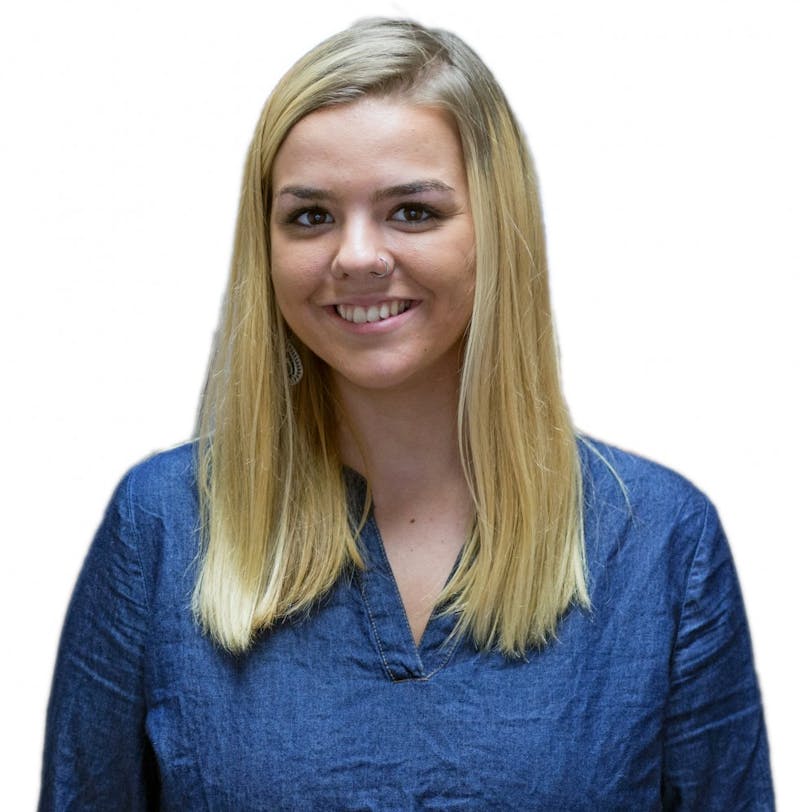Griffin Policy Forum discusses the reality of polarization in politics
Political disagreements today are no different now than they were in the past — there is just a stronger sense of divide in the country regarding the issues, said panelists at the Griffin Policy Forum.
More than 100 people gathered April 17 in Powers Ballroom to attended the “Civility, Engagement and Polarized Politics” panel discussion. The forum featured five Michigan leaders as panelists, who discussed the extent and effect of polarization in American politics. All of the panelists have served as Griffin Endowed Chairs at Central Michigan University — a position created to honor men and women with an established history in public service. Those who have worked as a Griffin chair all share the ambition to build and strengthen political consciousness in the student body.
Panelists included U.S. Sen. Gary Peters, University of Michigan professor and political consultant Craig Ruff, former state representative Maxine Berman, Bill S. Ballenger, political reporter and creator of The Ballenger Report, and current Griffin Endowed Chair, Gary Randall.
Power of the government is in the hands of the people, the panelists said. Ruff said while politicians are leaders, they are moreover followers of the people in their political party.
“People don’t trust their political leaders,” Ruff said. “They think their political leaders have paralyzed the political process. (But) we the people have done it to ourselves.”
Berman said citizens need to take responsibility for the way politics has become divided. Many of the speakers agreed and said being active and engaged in political discourse is important.
“This is why your activism is so important, which is a part of this forum,” Peters said. “It starts with all of you, it starts with your friends. We’ve got to get past this and find some kind of common ground before we’re going to be able to get through this issue.”
Panelists agreed that polarization in the political climate is largely caused by social media, the amount of money spent during campaigns, gerrymandering and term limits within state government that don’t allow for the development of opposing party relationships.
The panel discussed how partisan division in the U.S. that created such polarization only seems extreme today because of the role technology plays in society. News is consumed most frequently online, on social media such as Facebook. However, reading the news through social media has resulted in confirmation bias in readers, panelists said.
Social media has “exasperated” problems that have always been there before, Ruff said.
The digital age has brought on the highest concentration of political disagreement, and the public needs to be more realistic about what government can and cannot do, Berman added.
"Social media has made probably the biggest difference,” Berman said. “People (have) access to everything at their fingertips, momentarily, whenever they want. There is an obligation to try to filter through some of this, to be a little more suspicious.”
Peters shifted the discussion toward gerrymandering, the manipulation of district boundaries to ensure people of similar political ideology are dominating certain areas during elections. He said it’s a serious issue because district election winners are essentially already decided before the general election even occurs.
Grand Rapids graduate student Kayla Foley said the forum was helpful because it showed students and attendees how they can make a difference.
“Just (by) seeing how issues directly affect the people who are actually (involved), it’s a learning experience at that point,” Foley said. “You can see (what) you can do, what things can be done to try to help build those bridges (and) what strategies those people (are using).”
Grand Blanc junior Elizabeth Trombley said one reason she attended the forum is because she’s a strong supporter of Peters. She also wanted to take advantage of the opportunity to see established leaders discuss their perspectives and thinks it’s essential to be politically informed.
“(People should) be involved in politics and government cause it’s what affects you,” Trombley said. “Even (at) a local level, not just nationally, just be involved in that — (don’t) just be a bystander.”




